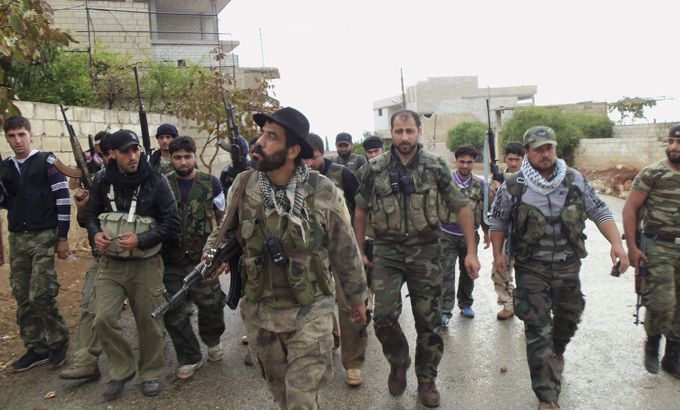Eid ceasefire ‘takes effect’ in Syria
Military command pledges to suspend operations for four days, but says it reserves right to respond to rebel attacks.

Syria’s army command has said it is suspending military operations to mark the Muslim holiday of Eid al-Adha, declaring a ceasefire from Friday morning to Monday.
As serious doubts remain about the prospects of the four-day ceasefire, the army said on Thursday it reserved the right to respond to rebel attacks and bombings, in a statement broadcast on state television
The military will also “respond to terrorist groups trying to reinforce their positions by arming themselves and getting reinforcements”, as well as neighbouring countries facilitating the smuggling of fighters across borders during the ceasefire.
The Syrian president, Bashar al-Assad, made a rare public appearance on Friday morning, praying at a Damascus mosque to mark the start of the Eid holiday.
Just after the government’s announcement, a commander in the opposition Free Syrian Army told the Reuters news agency that its fighters would commit to the truce, but demanded the release of opposition prisoners on Friday.
“What we are hoping and expecting is that they will not just talk the talk of ceasefire, but that they will walk the walk, beginning with the regime,” US State Department spokeswoman Victoria Nuland said.
The truce was brokered by Lakhdar Brahimi, the UN-Arab League joint envoy, who said that the ceasefire could lead to a longer truce and political negotiations between the sides.
Al Jazeera’s Rula Amin, reporting from Beirut in neighbouring Lebanon, said: “What’s interesting about this ceasefire is that it’s more of a positive gesture from both sides on the ground … to show good faith in Brahimi’s mission.”
Ban Ki-moon, the UN secretary-general, welcomed the planned ceasefire and said it was important that the Syrian government and opposition groups adhere to the truce, his spokesman said.
“We would simply fervently hope that the guns do fall silent, that there is a suspension in the violence so that humanitarian workers can help those who are most in need,” Ban’s spokesman Martin Nesirky told reporters.
“The world is now watching,” he said.
UN aid awaits ceasefire
Brahimi has crisscrossed the Middle East in the past two weeks to push the warring factions and their international backers to agree to the truce – a mission that included talks with Assad in Damascus at the weekend.
“When [Brahimi] left Damascus, he didn’t have a very solid agreement, but he did call on the government to start to initiate the ceasefire. He said the government should announce that it is halting its fire on its own, and the opposition would reciprocate – and that is exactly what has happened,” our correspondent reported.
|
|
| How temporary is Syria’s truce? |
Both sides have violated previous ceasefire agreements.
Activists say more than 35,000 people have been killed since the uprising against Assad began in March 2011.
The UN’s refugee agency said on Thursday that, if the ceasefire holds, it is ready to send emergency aid to thousands of Syrian families in previously inaccessible areas.
“In all, some 550 tonnes of supplies are being made available for distribution to up to 13,000 affected families – some 65,000 people – in several previously inaccessible areas,” the UN High Commissioner for Refugees said in a statement.
Some 1.2 million people inside Syria are in need of emergency humanitarian aid, according to the UN, which aims to distribute non-food aid packages to 500,000 people by the end of the year.
Violence continues
The latest developments came as violence in the country showed no signs of abating.
In the northern city of Aleppo, rebels moved into a Kurdish district on Thursday and clashed with troops as mortar fire killed at least nine people in the strategic area, residents said.
In the northeastern province of Raqa, rebels reportedly took control of a military post in a dawn raid, killing three soldiers and seizing arms and equipment, including a tank.
Regime forces meanwhile bombed rebel bastions northeast of the capital Damascus, where three rebels were killed in street fighting and three civilians died in artillery shelling.
Fighting also erupted in Damascus’ southern districts of Qadam and Tadamun, where a car bomb killed eight people on Wednesday, as shells rained on the town of Daraya further south.
In the central province of Homs, three girls – all civilians – were killed as the army pummelled rebel-held Rastan and the Khaldiyeh district in Homs city.
Two civilians were killed in sniper fire and shelling elsewhere in the province, activists said.